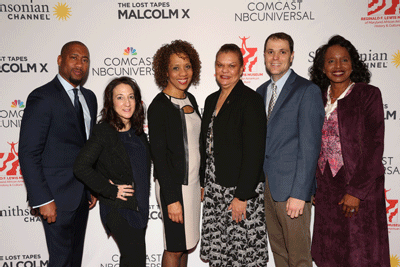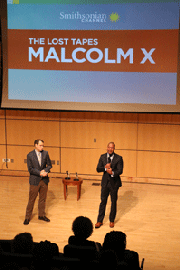Comcast and the Smithsonian Channel have teamed up to present what many have described as a powerful documentary about Malcolm X.
Screenings of “The Lost Tapes: Malcolm X” were presented in several cities across the country as part of the celebration of Black History Month. The documentary premieres on the Smithsonian Channel on Monday, February 26, 2018.
The screening tour, however, began with screenings at the Reginald F. Lewis Museum of African American History & Culture in Baltimore and the Smithsonian National Museum of African-American History & Culture in Washington, D.C.
A special event is scheduled for February 21 — the 53rd anniversary of Malcolm X’s death — at the National Black Theatre in Harlem, where his daughter, Ilyasah Shabazz, is scheduled to speak.
“I thought it was great. In my opinion, the documentary was great and it was great to bring it to the Baltimore community which is totally in keeping with our community investment mission,” said Donna Rattley-Washington, the vice president of government affairs and community investment for Comcast. “It was great to be able to use our resources to bring groups in the community together, our thought partners, our political partners… to have dialogue about the issues that impact us all.”
Presented entirely through his speeches, newscasts and rarely seen archival footage, “The Lost Tapes: Malcolm X” tells the story of the civil rights activist who put his life in jeopardy in order to effect change and equality for African-Americans.
Rattley-Washington says one of the takeaways from the screenings in Baltimore and Washington was that the style of the film with its no narrative, no interview approach.
“It was just all footage. The point was that we wanted Malcolm’s words to tell the story, tell the narrative and the narrative was clear,” Rattley-Washington said. “Malcolm started in one place with a philosophy and ended up in a movement of embracing all people of all color.”
Filmmaker Tom Jennings of 1895 Films says all the films in the Smithsonian Channel series called “Lost Tapes,” have no narration or interviews. He told Eve Ferguson of the Washington Informer that they only use archival materials to tell the story.
“In this film, you get to see two or three minutes of film at a time,” Jennings said. “You feel like you are in the room. The film is intended to make you feel like you are in a time machine and you can go back to the early 1960s.”
Much of the footage used to produce the film came from Washington University in St. Louis, who had archival footage in their library, but only had a last name of the donor.
“We found color footage of early Nation of Islam meetings that had never been seen [publicly],” Jennings told Ferguson. “We asked people where they thought it came from, and a woman said she thought it came from Elijah Muhammad’s dentist named Abdu Salaam who lived in Chicago.”
The filmmaker was unable to use any footage for which he could not get a license, so he called every Abdu Salaam in Chicago and was able to finally connect with his son, who had additional footage filmed by his father in the late 1950s that also had never been shown publicly.
“The Lost Tapes: Malcolm X,” also uses news tapes and other previously released footage to document Malcolm’s joining and ultimately leaving the Nation of Islam, as he went on to create his own organization as el-Hajj Malik el-Shabazz.
Courtesy Photo/Comcast
John Cavanagh, Executive Producer, Smithsonian Channel and Damion Thomas, PhD, Curator, National Museum of African American History and Culture discuss the film and answer audience questions.
The screenings feature panel discussions by John Cavanagh, the executive producer of the Smithsonian Channel and Damion Thomas, the curator at the National Museum of African American History and Culture.
Dana De Santo, the director of distributor marketing for the Smithsonian Channel; Sharon Green Middleton, the vice president of the Baltimore City Council; and Wanda Draper, the executive director of the Reginald F. Lewis Museum; were among the executives to attend the Baltimore screening.
Making the screenings all the more exciting was the presence of Damion Thomas, the senior curator for the Smithsonian National Museum of African American History and Culture, Rattley-Washington said.
“Damion, who is also a professor at the University of Maryland, offered amazing historical contextual information for the film,” she said. “He was able to put it in the Pan African context and he was such a great addition to the panel because when folks had questions about certain historical events, he could answer.”

